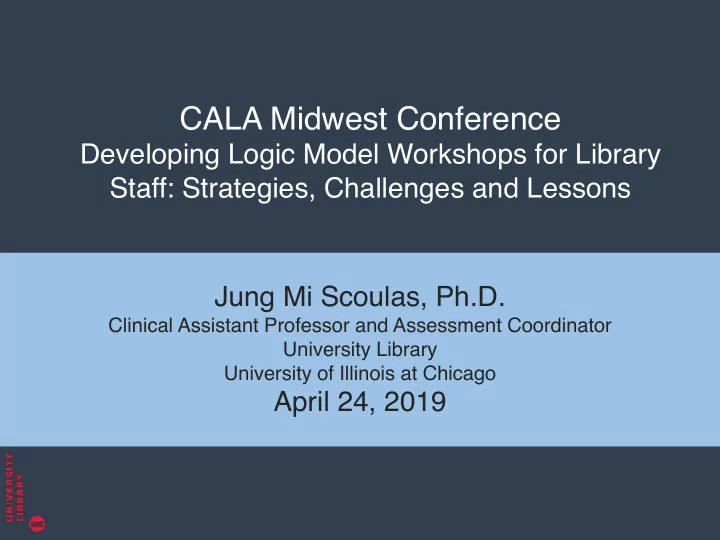

CALA Midwest Conference Developing Logic Model Workshops for Library Staff: Strategies, Challenges and Lessons Jung Mi Scoulas, Ph.D. Clinical Assistant Professor and Assessment Coordinator University Library University of Illinois at Chicago April 24, 2019
About the Assessment Coordinator Various Work Ph.D. Library Experience MEd Assessment
Agenda ü About UIC & University Libraries ü Background ü 6 Strategies ü 3 Challenges 3
About UIC & University Libraries q Public Research University q 4 Libraries q 15 colleges Richard Daley Library q 30,000 students Library of Health Science-Chicago q 4,500 faculty Library of Health Science-Peoria q One of top 5 racially and ethnically Library of Health Science-Rockford diverse universities in U.S. q 14 departments q 56 faculty (13 subject librarians) q 74 staff 4
Background UIC Library developed Provide professional Build a culture of strategic plans using development training assessment Logic model for library staff 5
What is a Logic Model? “ Graphic representation of a program showing the intended relationships between investments and results (Taylor-Powell & Henert, 2008) ” Input Output Outcome Theory of Program Outcome Roadmap Change Logic map 6
6 Strategies 7
Strategy 1: Conduct Pilot Workshops Two departments: • Research Services and Resources department (n=20) and Resource, Acquisitions and Management department(n=20) • November and December 2018 • 30 minutes during department meetings • A total of 25 library staff participated Feedback: It is very difficult to fit the material into 30 minutes; I think you can omit a few examples at the end. Spend a longer time clarifying the differences between input vs. output vs. outcome as this is essential to using a logic model. Maybe this could be done by discussing the reasons people got certain questions wrong in the game. 8
Strategy 2: Understanding Participants’ Needs and Prior Knowledge Before Workshop After Workshop Workshop Pre-survey Pre-test Post test evaluation • • Time • 6 multiple • 6 multiple Were you aware • Content choice choice of the logic • Application questions of questions of model concept? • Have you had logic model logic model concept concept any experience using logic model? • what do you hope to learn from the workshop? 9
Strategy 2: Understanding Participants’ Needs and Prior Knowledge (Example) Were you aware of the logic model Have you had any experience concept? using the logic model? AC2 & ASC Others AC2 & ASC Others 14.30% 28.60% No No 64.50% 75.90% 85.70% 71.40% Yes Yes 35.50% 24.10% I hope to learn: “Best ways to teach logic model concepts” “How to use it for project planning” ”Fuller understanding of the model so can more freely apply the model to new projects” “how to be better at creating outcomes vs outputs” “I hope to get a refresher - it has been a long time” “Who/where/when/why we are applying it in the library” “Not sure... looking forward to it! :)” 10
Strategy 3: Sharing the University Dean’s Message 11
Strategy 4: Group Activity Ø Form groups of 3-4 people Ø Each group will be given a logic model chart with cards Ø Put the cards into the correct column of the logic model chart Ø The first group to complete the chart correctly wins! Photo: Staff practicing the basics of the logic model concepts by working with groups. From left to right: Erin Glasco (Special 12 Collections), Teresa Moreno (RSR), and Jennifer Jackson (RSR).
Strategy 5: Sharing Examples Goal: Improve swimming skills Inputs Outputs Outcomes • Types of • Money • Know how to swim swimming • Coach • Increase confidence in styles (butter • Time swimming fly, • Internet • Teach others swimming backstroke, • Equipment • Volunteer as a life guard front crawl) (swim suits, • Pursue a second career • # of lessons goggle, ear • # of feedback plug) • # of youtube 13
Example 1: Goal- To Prevent Diet Related Health Problems in Adulthood 14 Source: Focus on- Logic model a planning and evaluation tool
Example 3: Goal- To Reduce the Prevalence of Overweight and Obesity among Adolescents by 2020 15 Source: Focus on- Logic model a planning and evaluation tool
Example 3: Framework Developed by the ALA Executive Board 16 Source: Strategic Framework developed by the ALA Executive Board, February 2014 (p.6)
Strategy 6: One-on-One Consultation after the Workshops • Strategic Plans (October-December, 2019) • Grant Projects (March-April, 2019) • Onboarding Process Project (February, 2019- Present) • Undergraduate Engagement Program (March, 2019) 17
Accomplishments 18
Accomplishments Date: November, 2018- Present 33% 36% 4 43 Library staff 5 Teams out of 14 Ongoing projects participated 19
Challenges 20
Challenge 1: Preparation is Required • Based on the survey, contents need to be tailored 21
Challenge 2: Lower Response Rate for Evaluation and Post test • Post survey (58%)and • Presurvey and pre-test post-test (37%) (88%) 22
Challenge 3: Promoting the Workshops 23
Resources University of Wisconsin- Extension: Logic Models & Training Guides W.K. Kellogg Foundation: Logic Model Development Guide Focus On: Logic Model- A planning and evaluation tool ALA example: Develop a sustained national advocacy campaign to increase public awareness of the value, impact and services provided by librarians and libraries of all types 24
Recommend
More recommend